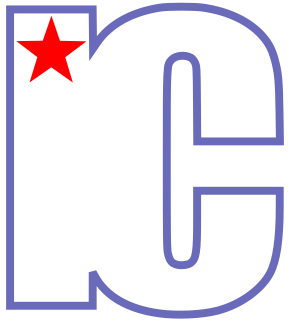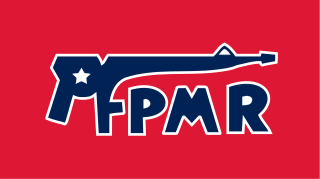Related Research Articles

Chile, officially the Republic of Chile, is a country in the western part of South America. It occupies a long, narrow strip of land between the Andes to the east and the Pacific Ocean to the west. Chile covers an area of 756,096 square kilometers (291,930 sq mi), with a population of 17.5 million as of 2017. Chile is the southernmost country in the world, the closest to Antarctica, and borders Peru to the north, Bolivia to the northeast, Argentina to the east, and the Drake Passage in the far south. Chile also controls the Pacific islands of Juan Fernández, Isla Salas y Gómez, Desventuradas, and Easter Island in Oceania. It also claims about 1,250,000 square kilometers (480,000 sq mi) of Antarctica under the Chilean Antarctic Territory. The country's capital and largest city is Santiago, and its national language is Spanish.
The territory of Chile has been populated since at least 3000 BCE. By the 16th century, Spanish conquistadors began to colonize the region of present-day Chile, and the territory was a colony between 1540 and 1818, when it gained independence from Spain. The country's economic development was successively marked by the export of first agricultural produce, then saltpeter and later copper. The wealth of raw materials led to an economic upturn, but also led to dependency, and even wars with neighboring states. Chile was governed during most of its first 150 years of independence by different forms of restricted government, where the electorate was carefully vetted and controlled by an elite.

The Socialist Party of Chile is a centre-left political party. Its historic leader was President of Chile Salvador Allende, who was deposed in a coup d'état by General Augusto Pinochet in 1973. Twenty-seven years later, Ricardo Lagos Escobar represented the Socialist Party in the 1999–2000 Chilean presidential election. He won 48.0% in the first round of voting and was elected with 51.3% in the second round. In the 2001 Chilean parliamentary election, as part of the Coalition of Parties for Democracy, the party won 10 out of 117 seats in the Chamber of Deputies of Chile and 5 out of 38 elected seats in the Senate. After the 2005 Chilean parliamentary election, the party increased its seats to 15 and 8, respectively. In the 2009 Chilean parliamentary election, it retained 11 Congressional and 5 Senate seats.

Miguel Humberto Enríquez Espinosa was a physician and one founder of the Chilean political party and former left-wing organization Movement of the Revolutionary Left (MIR), founded 1965. He was General Secretary of the MIR between 1967 and his death in 1974.

Chile holds nationwide presidential, parliamentary, regional and municipal elections.

The Green Ecologist Party is a Chilean political party and one of South America's members of the global green movement.

The Citizen Left Party of Chile, known until 2013 as Christian Left Party of Chile was a Chilean left-wing political party. Founded in 1971, in its early days it was suppressed by the Pinochet dictatorship. It was part of the Nueva Mayoría coalition, supporting the presidential candidacy president Michelle Bachelet in 2013.

The Revolutionary Left Movement is a Chilean left-wing political organization and former urban guerrilla organization founded on 12 October 1965. At its height in 1973, the MIR numbered about 10,000 members and associates. The group emerged from various student organizations, mainly from University of Concepción, that had originally been active in the youth organization of the Socialist Party. They established a base of support among the trade unions and shantytowns of Concepción, Santiago, and other cities. Andrés Pascal Allende, a nephew of Salvador Allende, president of Chile from 1970 to 1973, was one of its early leaders. Miguel Enríquez Espinosa was the General Secretary of the party from 1967 until his assassination in 1974 by the DINA.

The Manuel Rodríguez Patriotic Front was a Chilean revolutionary and Marxist-Leninist guerrilla organisation officially founded on 14 December 1983 as the paramilitary arm of the Communist Party of Chile (CPCh) in the context of this party policy denominated as the "Política de Rebelión Popular de Masas", created with the goal of a violent overthrow of the civic-military dictatorship of general Augusto Pinochet.

Armando Villanueva del Campo was a Peruvian politician who was the leader of the Peruvian American Popular Revolutionary Alliance. Born in Lima, his parents were Pedro Villanueva Urquijo, a gynecologist in the city, and Carmen Rosa Portal del Campo. His only legitimate sibling was his older brother Ing. Pedro Villanueva del Campo Portal.

The National Party or Montt-Varist was a Chilean political party formed in 1857 as a split from the Conservatives by the supporters of President Manuel Montt and Interior Minister Antonio Varas. The National Party had a liberal-conservative ideology and was primarily supported by middle-high businessmen, bankers and journalists. The Welsh-born Edwards family was a bigger financer of the party, along with the aristocratic Balmaceda, who was linked to the Liberal Party. The party never was more than an influential third party, and since the late 1910s its influences declined considerably, stopping from participating to national elections after 1924, finally merging into the United Liberal Party in 1933. The monttvarista National Party is not to be confused with the National Party formed in 1966.

The Allende family is a Chilean family of Spanish descent. They became well known during the 19th century and are based in Santiago. They have played a very significant role in Chilean politics.

Friar José Camilo Henríquez González was a priest, author, politician, and is considered an intellectual antecedent to and founding father of the Republic of Chile for his passionate leadership and influential writings. He was also one of the most important early South American newspaper writers and wrote several essays, most notably the Proclama de Quirino Lemachez, which promoted Chilean independence and liberty. He also wrote under the pseudonym Quirino Lemachez.
Falangism in Latin America has been a feature of political life since the 1930s as movements looked to the national syndicalist clerical fascism of the Spanish state and sought to apply it to other Spanish-speaking countries. From the mid-1930s, the Falange Exterior, effectively an overseas version of the Spanish Falange, was active throughout Latin America in order to drum up support among Hispanic communities. However, the ideas would soon permeate into indigenous political groups. The term "Falangism" should not be applied to the military dictatorships of such figures as Alfredo Stroessner, Augusto Pinochet and Rafael Trujillo because while these individuals often enjoyed close relations to Francisco Franco's Spain, their military nature and frequent lack of commitment to national syndicalism and the corporate state mean that they should not be classed as Falangist. The phenomenon can be seen in a number of movements both past and present.

Marco Antonio Enríquez-Ominami Gumucio is a Chilean-French, filmmaker, politician, and perennial candidate. From 2006 to 2010 he was a Socialist Party deputy in Chile's lower chamber. In 2009 he quit the party and ran for President of the Republic as independent, where he finished third with 20% of the vote. He is currently the leader of the Progressive Party, which he founded in 2010.
The Revolution of 1851 was an attempt by Chilean liberals to overthrow the conservative government of president Manuel Montt and repeal the Chilean Constitution of 1833. After various battles and sieges, by late December 1851 government forces had subdued the revolutionaries.

The anarchist movement in Chile emerged from European immigrants, followers of Mikhail Bakunin affiliated with the International Workingmen's Association, who contacted Manuel Chinchilla, a Spaniard living in Iquique. Their influence could be perceived at first within the labour unions of typographers, painters, builders and sailors. During the first decades of the 20th century, anarchism had a significant influence on the labour movement and intellectual circles of Chile. Some of the most prominent Chilean anarchists were: the poet Carlos Pezoa Véliz, the professor Dr Juan Gandulfo, the syndicalist workers Luis Olea, Magno Espinoza, Alejandro Escobar y Carballo, Ángela Muñoz Arancibia, Juan Chamorro, Armando Triviño and Ernesto Miranda, the teacher Flora Sanhueza, and the writers José Domingo Gómez Rojas, Fernando Santiván, José Santos González Vera and Manuel Rojas. At the moment, anarchist groups are experiencing a comeback in Chile through various student collectives, affinity groups, community and cultural centres, and squatting.

The Revolutionary Workers Party is a Trotskyist political party in Chile. It was founded in January 2017 and was the Chilean section of Trotskyist Fraction – Fourth International.

Celinda Arregui de Rodicio was a Chilean feminist politician, writer, teacher and suffrage activist best known for her work in favor of the rights of women in the political, social and civil spheres in Chile.
References
- ↑ "Chile: Acerca del Mirismo (in Spanish)". 2007-03-13. Archived from the original on 13 March 2007. Retrieved 2021-12-23.